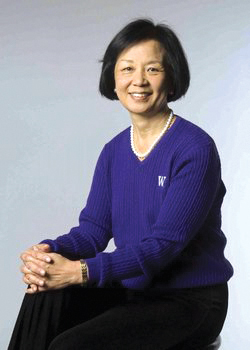By Chinami Tajika
Northwest Asian Weekly

Phyllis Wise
“I was always interested in biology. I can’t remember a time when I wasn’t.”
Phyllis Wise, now the first woman and Asian American president of the University of Washington (UW), still holds a passionate ardor for her research, which seeks to answer fundamental questions about the integration of endocrine and brain functions.
She grew up as a daughter of a distinguished neuroscientist and a nurse. Her parents immigrated to the United States from China in 1938. Her father has a medical degree from Beijing Union Medical College and a doctorate in philosophy from Northwestern University. Her mother has a nursing degree from Yenching University and a teaching nursing education degree from Colombia’s Teachers College.
“When I was very young, I used to go to my father’s lab on the weekends, watching experiments,” said Wise of her childhood. “Science was infused into me all the time.”
Both of her parents were serious about her education, and she has met their expectations. She has a bachelor’s degree in biology from Swarthmore College and a doctorate in zoology from the University of Michigan.
“My parents always assumed I would go to college,” said Wise. “It was never a question of whether I would go to college. And in fact, I think the assumption was that I would go beyond college. I think my father assumed that I’d become a medical doctor. So it was always aimed at that. We didn’t talk about [college] very much. But it was just assumed.”

Wise as a baby
However, this doesn’t necessarily mean that she has never faced difficulties in her life. When she entered graduate school, she had to choose a mentor in order to do research. She was tucked in the first step. “The very first person that I approached said to me that he did not accept women graduate students because [he said] they were never serious. They always got married and had children,” explained Wise.
“So I studied under a different person who was very understanding of the importance of diversity in the lab,” Wise continued, “whether or not [that means] men and women, or whether it’s different races or cultural backgrounds.”
Now, she is serving as president of the UW. She is the first woman and Asian American to do so.
“Oftentimes, when you have diverse students, there is some richness in interactions that you can’t get from all of one kind — either all men or all women or all of anything,” said Wise, looking back on her experiences.
According to Wise, being Asian American and female means that people will be watching her carefully.
“I think it was assumed that women are probably not as serious about their careers as men are. We are proving that this is wrong. I think that people assumed Asian Americans would be less assertive, and they will not insist on doing their work,” Wise continued. “But I think that is fast changing. I hope that these days, those kinds of assumptions are not made.”
Her research focuses on brain function and how hormones influence it, especially strogens, which are produced by the human ovaries.
In 2008, she received an honorary doctorate from Swarthmore College and was elected to the National Academy’s Institute of Medicine. And in the same year, the Puget Sound Business Journal named her one of its 2008 Women of Influence.
“What is so exciting about biology is that you’re studying living systems and also plants,” said Wise. “And the process is always changing, so you get to study what allows physiological changes to occur and the organism to continue to function. There are so many times of major physiological changes — puberty or pregnancy or [stress]. I find it fascinating how the body can adapt.”
Regarding being the president of UW, she said she has had to slow her research down a lot, which she conducted for the last five years while she was provost. “I’m not sure yet [what the future holds for my research], but I will concentrate on the job of being president,” said Wise.
She currently has a few post-doctoral fellows in her laboratory.
“I’m very seriously thinking about not doing [research] for very much longer because I think that [being president] is very important and a very big responsibility that I should really concentrate on. But I love the science. So I’m hoping on collaborating with others.”
No matter how busy she will become, she said she will never lose her passion for biology and physiology, which are essential parts of her life. “I truly enjoy studying biology and physiology. It was just natural to start studying [them] for me.” ♦
Chinami Tajika can be reached at info@nwasianweekly.com.



